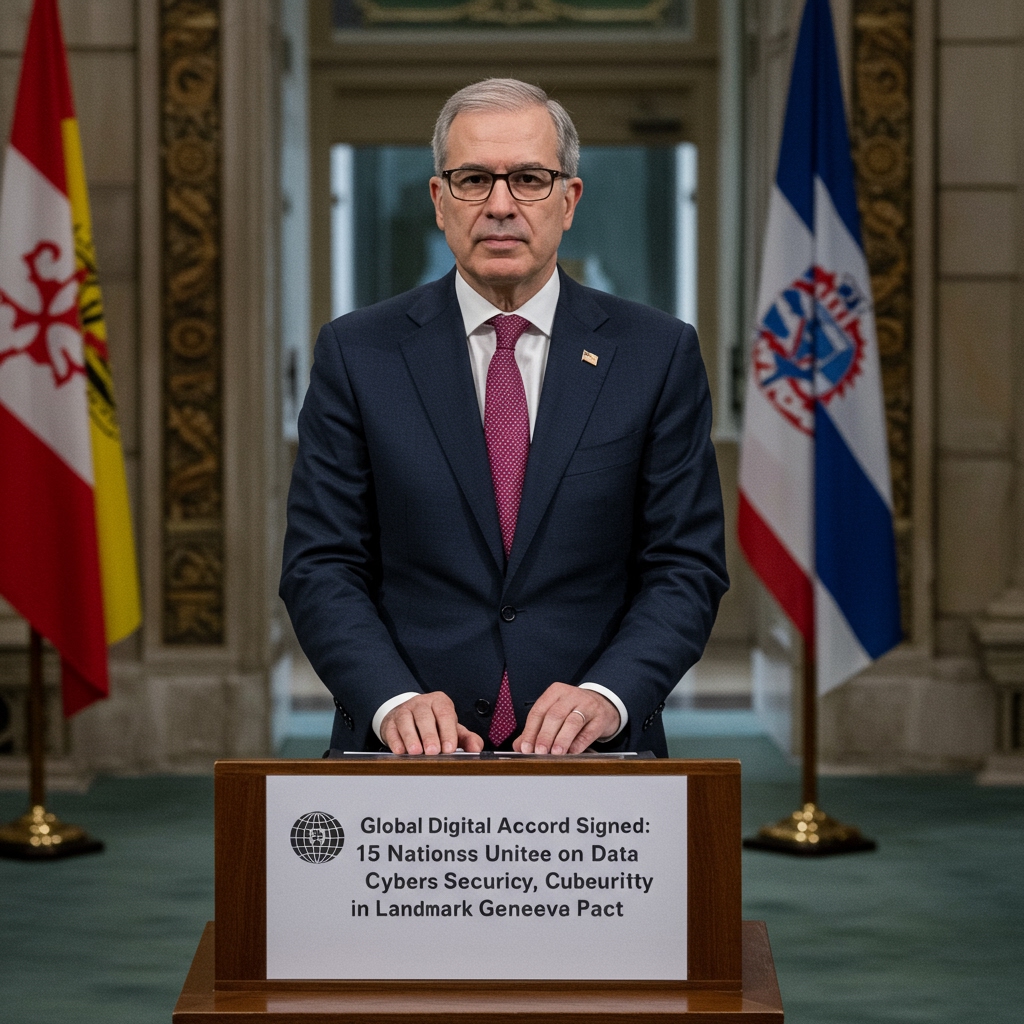15 Nations Forge Global Digital Accord in Historic Geneva Summit
Geneva, Switzerland – March 10, 2025 – Representatives from 15 nations, including major global economies such as the European Union, the United States, and Japan, formally signed the landmark Global Digital Accord during a pivotal summit held in Geneva today. This comprehensive international agreement is poised to establish unified international standards addressing crucial aspects of the digital realm, specifically data privacy, cybersecurity cooperation, and cross-border data flow regulation. The Accord arrives amidst a landscape of rising digital threats and increasing fragmentation in global digital governance.
The signing ceremony in Geneva marked the culmination of over two years of intense negotiations that were expertly hosted and facilitated by the United Nations Digital Alliance (UNDA). The Accord represents a significant collective effort to build a more predictable, secure, and harmonized global digital environment. Delegations emphasized the necessity of unified action to protect citizens’ data, safeguard critical infrastructure, and enable secure economic activity in an increasingly interconnected world.
Key Provisions Driving Digital Harmonization
The Global Digital Accord lays out a framework designed to foster trust and cooperation among signatory nations. Its key provisions are structured around three core pillars:
1. Data Privacy Standards: The Accord commits signatories to adopting common principles for the collection, processing, storage, and transfer of personal data. While respecting national legal frameworks, the pact encourages convergence towards high standards of individual data protection, emphasizing transparency, consent, and robust data security measures. This aims to reduce friction caused by divergent national privacy laws and enhance user trust.
2. Cybersecurity Cooperation: Recognizing the transnational nature of cyber threats, the agreement establishes mechanisms for enhanced cooperation in cybersecurity. This includes provisions for timely information sharing regarding cyber threats, vulnerabilities, and incidents, as well as joint efforts in responding to major cyberattacks. The Accord promotes mutual assistance in digital forensic investigations and capacity building among member states to bolster collective cyber resilience.
3. Cross-Border Data Flow Regulation: Acknowledging the importance of data flows for the global economy, the Accord seeks to create a more predictable and less restrictive environment for transferring data across national borders while upholding privacy and security requirements. It aims to develop standardized approaches to data localization rules and transfer mechanisms, potentially facilitating international trade and innovation while preventing data havens and ensuring accountability.
These provisions are intended to create a clearer rulebook for digital interactions among signatory nations, benefiting businesses, individuals, and governments alike by reducing uncertainty and mitigating risks.
Implementation and Oversight Structure
Central to the Accord’s implementation is the establishment of a joint oversight committee. This committee, which will be headquartered in Geneva, is tasked with monitoring the implementation of the Accord’s principles by signatory nations, providing guidance on interpretation, and facilitating dispute resolution. The committee will comprise representatives from each signatory nation, ensuring broad representation and shared responsibility for the Accord’s success.
A critical commitment undertaken by the signatories is to review national digital policies against the Accord’s principles. Nations have committed to undertaking this comprehensive review process by the end of 2026. This timeline provides a clear mandate for domestic policy adjustments necessary to align with the international standards agreed upon in Geneva. The oversight committee will play a key role in facilitating this review process and identifying areas where further alignment may be needed.
The Negotiation Journey and UNDA’s Role
The path to the Global Digital Accord was a complex and challenging one, involving over two years of intense negotiations hosted by the United Nations Digital Alliance (UNDA). UNDA played a crucial role as a neutral facilitator, bringing together diverse national perspectives and navigating sensitive discussions on sovereignty, security, and economic interests. The negotiations involved numerous rounds of technical discussions, high-level diplomatic exchanges, and significant efforts to bridge divides between different legal and regulatory traditions. UNDA’s persistence and commitment were instrumental in achieving this breakthrough agreement, which many observers once considered unattainable given the complexities involved.
Significance and Future Outlook
Analysts widely view the signing of the Global Digital Accord as a critical step towards establishing a more harmonized global digital landscape. In an era marked by increasing digital fragmentation and the potential for a ‘splinternet,’ this agreement signals a strong commitment from a significant bloc of nations to build common ground. Experts suggest the Accord could serve as a foundational model for broader international cooperation, potentially encouraging other nations to align with its principles over time.
However, the true impact of the Accord will depend on the commitment of signatory nations to fully implement its provisions and the effectiveness of the joint oversight committee. Challenges related to enforcement, adapting to future technological changes, and ensuring inclusivity will require ongoing effort and collaboration. Nevertheless, the successful negotiation and signing of this landmark pact in Geneva represent a significant moment in the evolution of international digital governance, offering a pathway towards a more secure, open, and unified digital future for the participating nations and potentially beyond.





